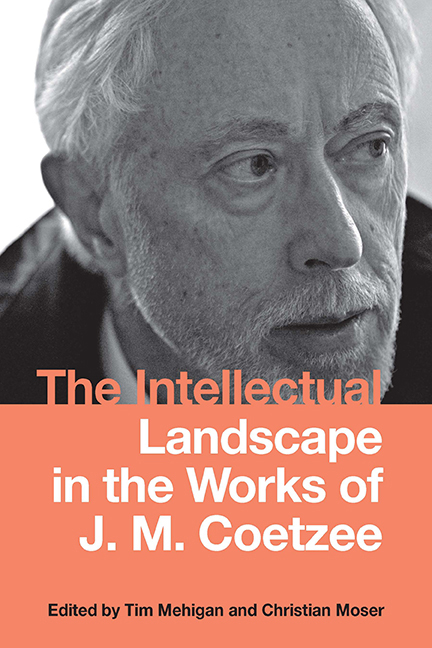Book contents
- Frontmatter
- Contents
- Acknowledgments
- Introduction: Coetzee's Intellectual Landscapes
- Part I Truth and Justification
- 1 J. M. Coetzee on Truth, Skepticism, and Secular Confession in “The Age We Live In”
- 2 Social Order and Transcendence: J. M. Coetzee's Poetics of Play
- 3 Autobiography and Romantic Irony: J. M. Coetzee and Roland Barthes
- 4 The Semantics of Barbarism in J. M. Coetzee's Novel Waiting for the Barbarians
- 5 In the Heart of the Empire: Coetzee and America
- Part II Objectivity and Communication
- Part III Convergence of Interpretative Horizons and Moral Solidarity
- Notes on the Contributors
- Index
5 - In the Heart of the Empire: Coetzee and America
from Part I - Truth and Justification
Published online by Cambridge University Press: 03 July 2019
- Frontmatter
- Contents
- Acknowledgments
- Introduction: Coetzee's Intellectual Landscapes
- Part I Truth and Justification
- 1 J. M. Coetzee on Truth, Skepticism, and Secular Confession in “The Age We Live In”
- 2 Social Order and Transcendence: J. M. Coetzee's Poetics of Play
- 3 Autobiography and Romantic Irony: J. M. Coetzee and Roland Barthes
- 4 The Semantics of Barbarism in J. M. Coetzee's Novel Waiting for the Barbarians
- 5 In the Heart of the Empire: Coetzee and America
- Part II Objectivity and Communication
- Part III Convergence of Interpretative Horizons and Moral Solidarity
- Notes on the Contributors
- Index
Summary
In my cell in the heart of America, with my private toilet in the corner, I ponder and ponder. I have high hopes of finding whose fault I am.
—J. M. Coetzee, “The Vietnam Project”IN HIS 2014 NOVEL 10:04, the American author Ben Lerner recounts a year in the life of a character who seems to resemble his creator: young, successful, Brooklyn-hip, and also named Ben. A similar protagonist narrates Lerner's first novel, Leaving the Atocha Station, a book that instigated the bidding war for 10:04, the writing of which being the primary plot of the latter work. If all this sounds rather self-referential, that is because it is. Leaving the Atocha Station is about a young American poet on a fellowship abroad, trying to become who he is. 10:04 is about the writing of a novel that is 10:04. Both are about nothing other than Ben Lerner.
This is not the first time a writer has fictionalized his own life, of course. J. M. Coetzee's whole career can be viewed as “a huge existential enterprise, grounded in fictionalized autobiography,” as David Attwell has argued recently. And Coetzee is part of a longstanding tradition. From its inception, the novel, as a literary form, has blurred the line between fact and fiction, with authorship itself being the easiest, or most readily available thing to obscure and make mysterious—Cervantes, Defoe, and Richardson prove as much. And Borges, in “Borges and I”—a text that influenced Coetzee's Nobel Prize Lecture, “He and His Man”— reminded us of this lesson in his inimitable way.
What are we to make, though, of Lerner's fictionalization not just of himself, but also of other famous self-fictionalizers? A scene in 10:04 describes a dinner thrown for the participants of a panel discussion sponsored by Columbia University's School of the Arts. It is a set piece reminiscent of the post-lecture dinner described in Coetzee's The Lives of Animals (and later, in Elizabeth Costello), and the fact that it seems to skewer a character all too similar to Coetzee, as Christian Lorentzen and others have noted, only heightens the hall-of-mirrors effect.
- Type
- Chapter
- Information
- The Intellectual Landscape in the Works of J. M. Coetzee , pp. 109 - 130Publisher: Boydell & BrewerPrint publication year: 2018
- 3
- Cited by

